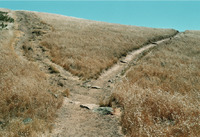Items
Site
The Medicine Chest
keywords is exactly
sliding doors
-

Door, 11 rue Larrey, New York.
-

Or
"The processes of digression and diversion have much in common with what the writer Ross Chambers (1999) calls ‘loiterature’. Chambers investigates the digressive, category-blurring genre of writing found in works such as Nicholson Baker’s 'The mezzanine', Paul Auster’s 'City of glass' and Laurence Sterne’s 'Tristam Shandy'. Loiterly writing, according to Chambers, disarms criticism by providing a moving target, shifting as its own divided attention constantly shifts. Criticism depends on the opportunity to discriminate and hierarchise, determining what is central and what is peripheral (Chambers 1999: 9), which this form eludes by resisting contextualisation or singular categorisation. Loiterature promotes sites of endless intersection, where attention is always divided between one thing and some other thing, always willing and able to be distracted, contrasting ‘the disciplined and the orderly, the hierarchical and the stable, the methodical and the systematic’ (Chambers 1999: 10). In contrast to methods of science that seek to stabilise objects within taxonomic systems or that require the formulation of hypotheses to provide direction for experimentation and a basis for concrete outcomes, the processes of curatorship and artmaking revel in rerouting and redirecting and in diversion and digression" (Liebenberg 2021: 286). -

About Ed Ricketts
"Just about dusk one day in April 1948 Ed Ricketts stopped work in the laboratory in Cannery Row. He covered his instruments and put away his papers and filing cards. He rolled down the sleeves of his wool shirt and put on the brown coat which was slightly small for him and frayed at the elbows. He wanted a steak for dinner and he knew just the market in New Monterey where he could get a fine one, well hung and tender. He went out into the street that is officially named Ocean View Avenue and is known as Cannery Row. His old car stood at the gutter, a beat-up sedan. The car was tricky and hard to start. He needed a new one but could not afford it at the expense of other things. Ed tinkered away at the primer until the ancient rusty motor coughed and broke into a bronchial chatter which indicated that it was running. Ed meshed the jagged gears and moved away up the street. He turned up the hill where the road crosses the Southern Pacific Railways track. It was almost dark, or rather that kind of mixed light and dark which makes it very difficult to see. Just before the crossing the road takes a sharp climb. Ed shifted to second gear, the noisiest gear, to get up the hill. The sound of his motor and gears blotted out every other sound. A corrugated iron warehouse was on his left, obscuring any sight of the right of way. The Del Monte Express, the evening train from San Francisco, slipped around from behind the warehouse and crashed into the old car. The cow-catcher buckled in the side of the automobile and pushed and ground and mangled it a hundred yards up the track before the train stopped" (Steinbeck 1951: 279). After Ricketts' death in 1948, Steinbeck dropped the species catalogue from the earlier 'The Sea of Cortez' and republished it with a eulogy to his friend added as an afterword.


